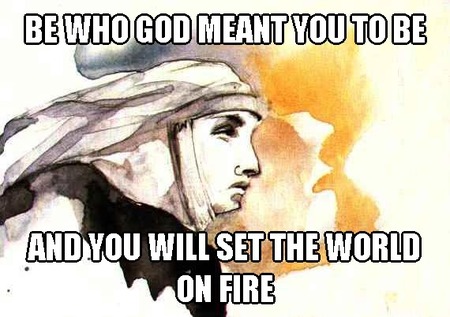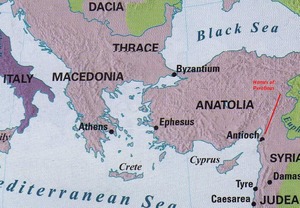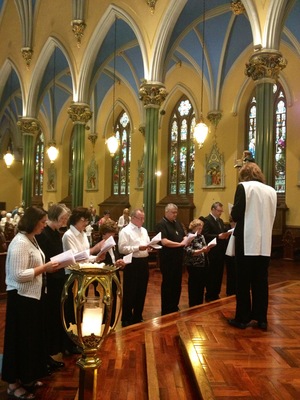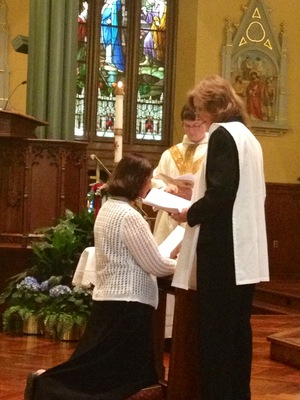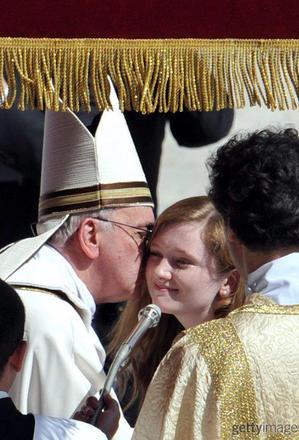Saint Catherine cut her hair and put aside her elegant clothing as an act of modesty, to shun the worldly attention of potential suitors and devote her life to Christ.
Set the world on fire by being who are meant to be…
Who else but the glory of Siena than Catherine who is so enkindled with the fire of Christ’s love for humanity to have said, “Be who God meant you to be and you will set the world on fire,” than Saint Catherine of Siena.
Under the patronage of Saint Catherine of Siena we ask her to beseech God for us for: fire prevention, purity, bodily illness, nurses, firefighters, illness, Italy, miscarriages, people ridiculed for their piety, sexual temptation, sick people, sickness, television.
Why Christians need Antioch
These weeks we are hearing the narrative of the very early followers of The Way, that is, those who adhere to the Good News taught by Jesus, the crucified and risen one.
With the killing of the deacon while kidnapping the two bishops in Syria has me concerned about Christians losing the sensitivity to the importance of Syria as a key Christian center. Most Western Christians forget that our Christians origins in the West was first formed in the East. Recall from Acts that “it was in Antioch that the disciples were first called Christians.” It was in Antioch, not in Rome, not in Moscow, not in Constantinople, that the disciples of Jesus of Nazareth were first generated by the Holy Spirit, they were called by name. It’s not West OR East, but West AND East when comes to Christian faith. Does Antioch have any resonance with you Christians? Do you have any concern for our Christian heritage in Syria? What’s our concern for those being killed for being Christian today? Do we even care? Remember: God has created each of us to do Him some definite service; let us live and work in charity for our neighbor.
A famous Antiochian saint, the bishop Ignatius said this in his letter to the Magnesians, “It is right, therefore, that we not just be called Christians, but that we actually be Christians” (4.1).
Too often do I hear that it was much easier to be a Christian of the early years following the Ascension of the Lord and the Pentecost than today. That’s a crazy idea! First of all, no one who knows history can hold that idea as valid. Those who really and truly followed Jesus Christ as Lord and Savior, Messiah and Word made flesh, were harassed and/or killed. The Acts of the Apostles testifies to the fact that Jesus’ followers were killed. There is little difference with state of Christianity in AD 13 than in 2013. So what happened to the Christians in the 1st century is no different than what the dictatorship in Syria is doing now.
So, we can’t allow Syria to further unravel and act contrary to faith and reason. We need to remember that Antioch is crucial to our Christian identity today because our faith in the Lord is no less real, no less beautiful, no less controversial today than in previous eras. It is in Antioch (Syria) that we our Christian identity (belief, liturgy, church tradition, music, science and culture) was formed. Antioch (that is, Syria in general) and the people who live there is the place where and the community where we’ve learned the horizons of our Hope in what Jesus promised.
A preacher whom I like very much is the Very Reverend Denis Robinson, OSB, the president-rector of Saint Meinrad School of Theology. Dom Denis is a Benedictine monk and priest who teaches systematic theology. In 2007, he earned a doctorate in theology specially in the work of Blessed John Henry Newman from the Catholic University of Louvain, Belgium. Recently, he said,
As long as we keep stored up in ourselves the well-rehearsed scripts of indifference, ineptitude, pain, doubt, self-loathing. As long as we think we know the answers, after all that’s what mamma said, until we see that the world is more complicated than the truth we learned at our mother’s knee Brothers and sisters, there is one thing and one thing only that we need. We need Antioch. We need that identity. We need Antioch because we must learn to call ourselves something other than forsaken. We need Antioch. We need to learn to love rather than judge, to give rather than take, to provide for one another rather than constantly seeking the self, the damn self that will be truly damned if we cannot give ourselves over to Christ, all to Christ, fully to Christ, forever to Christ. Where will it be? Where will it be then? If not in Antioch, where will it be? Brothers and sisters we continue to revel in this Easter season knowing I hope full well that the complex completeness of Easter did not come on that solemn night of proclamation. Antioch beckons us in the name of towns and places as yet unseen, unknown, unexplored. And we respond full of hope that the fullness of Easter is still rushing in.
Without perseverance no one can please God, St Catherine of Siena taught
Who we read impacts the way we live. Catherine of Siena, whom the Catholic Church honors today, has much to say to the modern person. In one of her letters we read the following, which ought to bolster our approach in our daily work.
To Sano Di Maco and All Her Other Sons in Siena: In the Name of Jesus Christ crucified and of sweet Mary:
Dearest sons in Christ sweet Jesus: I Catherine, servant and slave of the servants of Jesus Christ, write to you in His precious Blood: with desire to see you strong and persevering till the end of your life. For I consider that without perseverance no one can please God, or receive the crown of reward. He who perseveres is always strong, and fortitude makes him persevere.
Does What I Believe In Affect My Life?
Ultimate questions are critical for all persons. And so much for Christians because of the Incarnation of God in human history. What does it mean to believe? What can science teach us? Is using technology a helpful tool in knowing our Christian self? In a Year of Faith presentation on April 20, the topic at hand was “Does What I Believe In Affect My Life?”
Saint Catherine of Siena
Saint Catherine of Siena writes:
I want your security to be in Christ gentle Jesus. He has clothed us in the sturdiest garment there is, a garment of love….The very first garment we ever had was love, for it was only by love that we were created in God’s image and likeness.
(Letter 185-86)
Third Order Dominicans, New Haven, celebrate rites of reception and profession
“Among the means of holiness most useful and opportune for the defense of and progress of Christian faith and morals in our day, we recognize the Dominican Third Order as one of the most eminent, easy, and secure.”
Last year’s post on these same rites.
The Spirit changes us
At the Sacrifice of the Mass in St Peter’s Square, Pope Francis also celebrated the Rite of Confirmation with 44 people from around the world. As we approach Pentecost, this excerpt from his short homily is very instructive. Pay attention. Don’t forget to daily ask, no beg, for the Holy Spirit to have a special grace to embrace the day. May the Spirit be with these 44 newly confirmed in the Faith, indeed, all those around the world who are receiving the sacrament of Confirmation these days.
This is the work of the Holy Spirit: he brings us the new things of God. He comes to us and makes all things new; he changes us. The Spirit changes us! And Saint John’s vision reminds us that all of us are journeying towards the heavenly Jerusalem, the ultimate newness which awaits us and all reality, the happy day when we will see the Lord’s face – that marvelous face, the most beautiful face of the Lord Jesus – and be with him for ever, in his love.
You see, the new things of God are not like the novelties of this world, all of which are temporary; they come and go, and we keep looking for more. The new things which God gives to our lives are lasting, not only in the future, when we will be with him, but today as well. God is even now making all things new; the Holy Spirit is truly transforming us, and through us he also wants to transform the world in which we live. Let us open the doors to the Spirit, let ourselves be guided by him, and allow God’s constant help to make us new men and women, inspired by the love of God which the Holy Spirit bestows on us! How beautiful it would be if each of you, every evening, could say: Today at school, at home, at work, guided by God, I showed a sign of love towards one of my friends, my parents, an older person!
Giussani helps us to understand the struggle for meaning, purpose and beauty
In a recent article for the Our Sunday Visitor newspaper, Father Robert takes up the concept of the religious sense that Father Giussani taught, and that Cardinal Jorge Bergoglio –now Pope Francis spoke about. Shortly after the papal election I posted the chapter that Father Barron references in his article noted below, from A Generative Thought: An Introduction to the Works of Luigi Giussani (2003), where Bergoglio writes about our need to educate our religious sense and how Giussani influenced him in his method of dealing with ultimate questions.
You may read that chapter here that’s noted in a previous post on Communio.
Here is a paragraph of Barron’s OSV article. The full text is accessed here.
Part of Msgr. Giussani’s genius, Cardinal Bergoglio argued, was that he did not often commence his discourse with explicitly dogmatic or doctrinal language, but rather with an awakening of the often implicit religious sensibility that every person possesses. This sensibility expresses itself in terms of the most fundamental questions: What is my ultimate origin? What is my final destiny? Is there a meaning or logic that runs through the universe? Why, precisely, is there something rather than nothing? These interrogations lead ineluctably to God, for God alone can answer them.
Father Robert Barron
OSV Newsweekly, 5 May 2013
Christians follow a messiah who loved us more than himself
Today, we are observing the 5th Sunday of Easter (John 13:31-35).
“‘I give you a new commandment’, said Jesus: ‘love one another.’ But how, we may ask, could he call this commandment new? Through Moses, he had said to the people of old, ‘You shall love the Lord your God with all your heart and with all your mind, and your neighbor as yourself.’…He showed the novelty of his command and how far the love he enjoined surpassed the old conception of mutual love by going on immediately to add: ‘Love one another as I have loved you.’ To understand the full force of these words, we have to consider how Christ loved us.’…The law commanded people to love their brothers and sisters as they love themselves, but our Lord Jesus Christ loved us more than himself. He who was one in nature with God the Father and his equal would not have descended to our lowly estate, nor endured in his flesh such a bitter death for us, nor submitted to the blows given him by his enemies, to the shame, the derision, and all the other sufferings that could not possibly be enumerated; nor, being rich, would have he become poor, had he not loved us far more than himself. It was indeed something new for love to go as far as that!”
Saint Cyril of Alexandria

